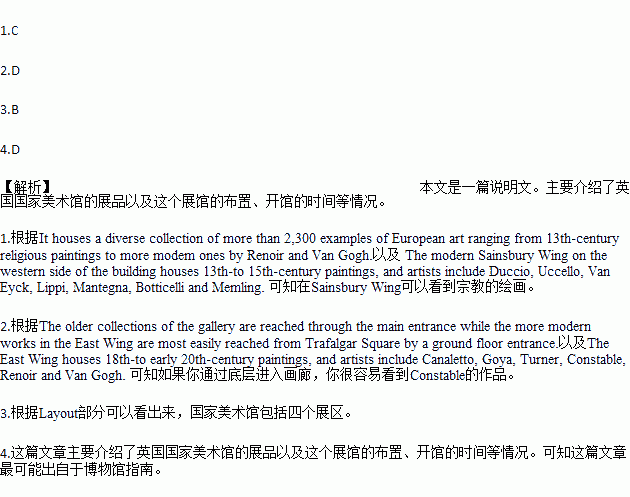题目内容
The National Gallery
Description:
The National Gallery is the British national art museum built on the north side of Trafalgar Square in London. It houses a diverse collection of more than 2,300 examples of European art ranging from 13th-century religious paintings to more modem ones by Renoir and Van Gogh. The older collections of the gallery are reached through the main entrance while the more modern works in the East Wing are most easily reached from Trafalgar Square by a ground floor entrance.
Layout:
The modern Sainsbury Wing on the western side of the building houses 13th-to 15th-century paintings, and artists include Duccio, Uccello, Van Eyck, Lippi, Mantegna, Botticelli and Memling.
The main West Wing houses 16th-century paintings, and artists include Leonardo da Vinci, Cranach, Michelangelo, Raphael, Bruegel, Bronzino, Titian and Veronese.
The North Wing houses 17th-century paintings, and artists include Caravaggio, Rubens, Poussin, Van Dyck, Velaazquez, Claude and Vermeer.
The East Wing houses 18th-to early 20th-century paintings, and artists include Canaletto, Goya, Turner, Constable, Renoir and Van Gogh.
Opening Hours:
The Gallery is open every day from 10am to 6pm (Fridays 10am to 9pm) and is free, but charges apply to some special exhibitions.
Getting There:
Nearest underground stations: Charing Cross (2-minute walk), Leicester (3-minute walk), Embankment (7-minute walk), and Piccadilly Circus (8-minute walk).
1.In which wing can you see religious paintings?
A. In the East Wing. B. In the main West Wing.
C. In the Sainsbury Wing. D. In the North Wing.
2.If you enter the gallery by a ground floor, you will easily see the works of .
A. Van Eyck B. Cranach
C. Van Dyck. D. Constable.
3.According to the passage, which of the following is true?
A. The National Gallery is the biggest British national art museum.
B. There are four exhibition areas in The National Gallery
C. The Gallery is open every day from 10am to 6pm
D. The Gallery is completely free
4.Where does the text probably come from?
A. An artist magazine. B. A tourist map.
C. A news report. D. A museum guide.


 following is the newspaper editor’s opinion according to Paragraph2?
following is the newspaper editor’s opinion according to Paragraph2? now.
now.